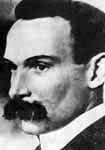


Name: Ambrose Small
Case Classification: Missing
Missing Since: December 2, 1919
Location Last Seen: Toronto, Ontario, Canada
Date of Birth: 1863
Age: 56 years old
Race: White
Gender: Male
Height: 5'6"
Weight: 134 lbs.
Hair Color: Brown. His hair had started to gray and recede and he had a "walrus" mustache.
Eye Color: Blue
Nickname/Alias: Unknown
Distinguishing Marks/Features: His face was reddened by broken blood vessels.
Dentals: Unknown
Fingerprints: Unknown
DNA: Unknown
Clothing: Dark color tweed suit, dark color coat with velvet collar
Jewelry: Unknown
Additional Personal Items: Felt hat.
Small went to work at the age of 13 in his father’s modest establishment, Toronto’s Warden Hotel. As he grew older, he began managing the hotel bar and booking entertainment for the customers. In addition to working for his father, Small also took a part-time job as an usher at the Grand Theater. He slowly worked up the ranks to assistant manager and then booking manager. These programs met with much success and Small began to prosper. He also began to buy interests in small theaters in and around Toronto. Small also began to acquire a couple of different reputations. One of them was as a daring gambler. He was never afraid to bet huge sums on races and while he always paid off when he lost, he was not above being involved in fixed races. He started to gain a number of enemies in racing circles and in his romantic life as well. He was also a notorious womanizer. Just before his 40th birthday, Small married Teresa Small, the wealthy heiress to a brewing fortune. Small began to use Teresa’s money to purchase scores of small theaters and to book the biggest-named talent that he could find into them. Small finally had his fortune and he realized his dream of owning the Grand Opera House. Within a few years, Small began to grow tired of his marriage and secure business life and he began gambling and seeing women again. As his fortunes grew, Small continued to make enemies
In 1919, Small and Teresa began negotiating the sale of the Small chain of theaters to a British-owned firm, Trans-Canada Theaters Limited. The deal was concluded on December 2, 1919 and the Small’s received a check for $1 million, with an additional $700,000 to be paid to them in installments over the next five years. The husband and wife endorsed the check and deposited it in their account at the Dominion Bank at 11:45 in the morning. That afternoon, Small told his lawyer, E.W.M. Flock that he planned to inform his secretary John Doughty that not only had Doughty been retained by the new firm as a secretary and booking manager, but he would see a substantial increase in salary. Attorney Flock saw Small again later that evening (around 5:30) at the Grand Opera House. Small was in a fine mood, celebrating the sale of the chain. He spent a few minutes with Small but then left to catch a train. A short time later, Small also left the opera house. Bundled up against the biting wind, cold and snow, he made with way to the corner of Adelaide and Yonge, ducking into the shelter of a newsstand operated by Ralph Savein. Small always picked up the paper around 5:30 when it arrived by train, however on this day, the papers had not been delivered because the train had been delayed by a snowstorm in New York. Savein said that Small cursed bitterly over the lack of the paper, which was something that he had never heard him do before. Small then trudged off into the snow and made his way down the block. He was the last person to report speaking with Ambrose Small. Several days passed before anyone realized that Small had disappeared. His wife and friends were so used to his dalliances and gambling that they guessed he had simply gone out of town for a few days.
Once his disappearance became official though, the authorities launched the biggest manhunt in Canadian history. As the hunt for Ambrose Small continued, many began to fear that the theater magnate had been murdered. The authorities conducted a painstaking search for the missing man. Every business in Toronto was searched and all six cities where Small had theaters were scoured for clues. Toronto Bay was dredged several times and the basement of the Small mansion on Glen Road was excavated. The search continued for years and as late as 1944, investigators were still digging up the basement of the Grand Opera House, hoping to find Small’s bones. Police reportedly sifted the Grand's huge furnace for human remains, but without success. After 1919, Ambrose Small was “spotted” in hundreds of places. The courts pronounced him officially dead in 1923. The Case of Ambrose Small was officially closed in 1960. But even then, the police were still receiving and investigating letters purporting to disclose Small's burial location. As late 1965, Toronto Police detectives inspected a possible grave site in Rosedale Valley.
Agency Name: Toronto Police Service - Missing Persons Unit
Agency Contact Person: N/A
Agency Phone Number: 416-808-7411
Agency E-Mail: N/A
Agency Case Number: 1919-123456.D14
NamUs Case Number: N/A
NCIC Case Number: N/A
National Centre for Missing Persons and Unidentified Remains
Added: Prior to 2011; Last Updated: 11-17-2022 - By: kc
Questions or comments? Please contact appropriate member of the Area Team
** Listed information is from the time of disappearance.
Return Home